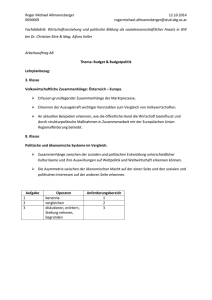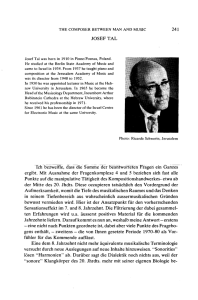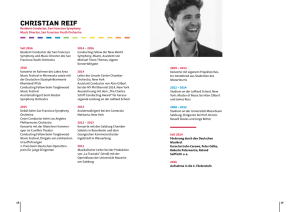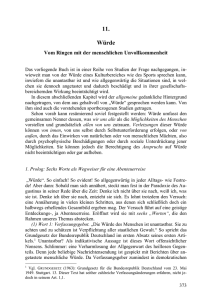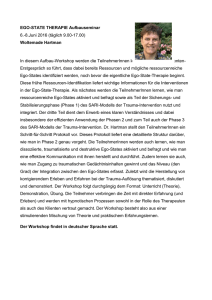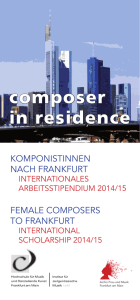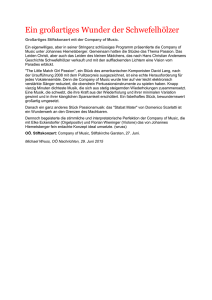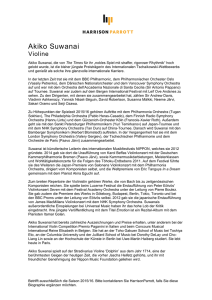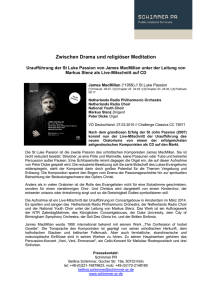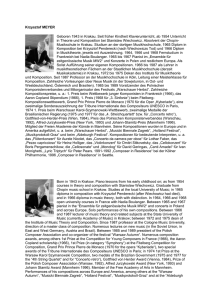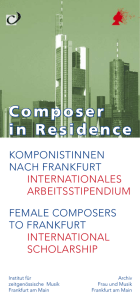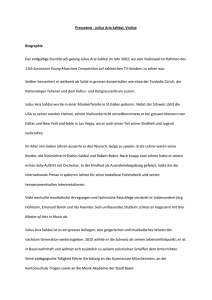Concert
Werbung
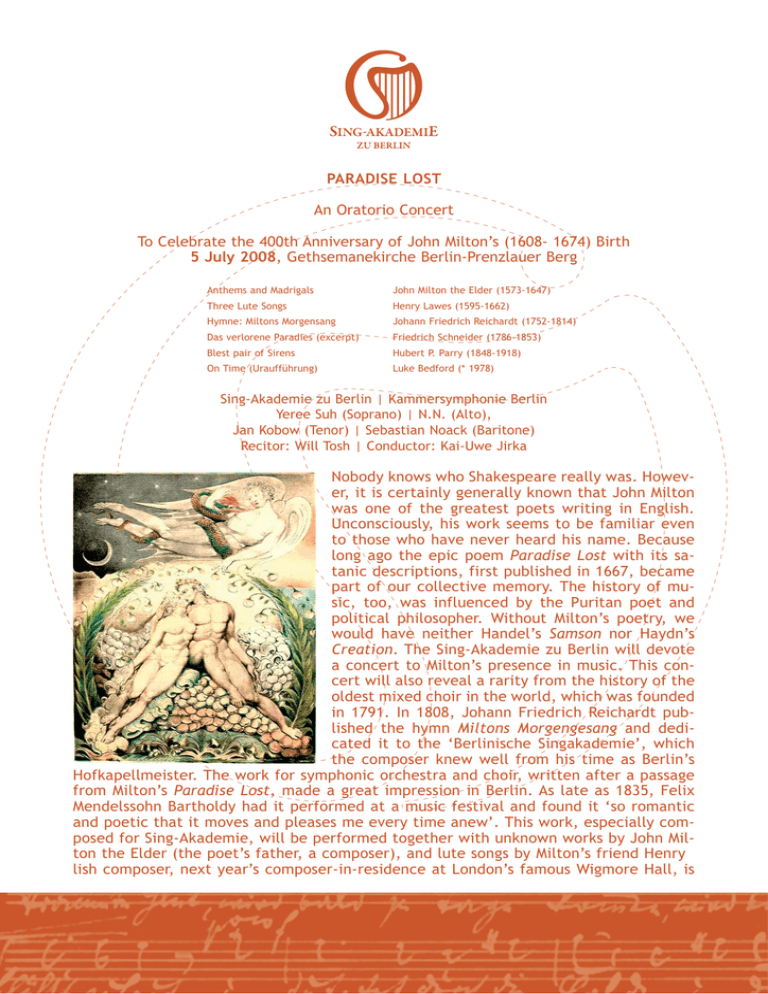
PARADISE LOST An Oratorio Concert To Celebrate the 400th Anniversary of John Milton’s (1608- 1674) Birth 5 July 2008, Gethsemanekirche Berlin-Prenzlauer Berg Anthems and Madrigals John Milton the Elder (1573-1647) Three Lute Songs Henry Lawes (1595-1662) Hymne: Miltons Morgensang Johann Friedrich Reichardt (1752-1814) Das verlorene Paradies (excerpt) Friedrich Schneider (1786-1853) Blest pair of Sirens Hubert P. Parry (1848-1918) On Time (Uraufführung) Luke Bedford (* 1978) Sing-Akademie zu Berlin | Kammersymphonie Berlin Yeree Suh (Soprano) | N.N. (Alto), Jan Kobow (Tenor) | Sebastian Noack (Baritone) Recitor: Will Tosh | Conductor: Kai-Uwe Jirka Nobody knows who Shakespeare really was. However, it is certainly generally known that John Milton was one of the greatest poets writing in English. Unconsciously, his work seems to be familiar even to those who have never heard his name. Because long ago the epic poem Paradise Lost with its satanic descriptions, first published in 1667, became part of our collective memory. The history of music, too, was influenced by the Puritan poet and political philosopher. Without Milton’s poetry, we would have neither Handel’s Samson nor Haydn’s Creation. The Sing-Akademie zu Berlin will devote a concert to Milton’s presence in music. This concert will also reveal a rarity from the history of the oldest mixed choir in the world, which was founded in 1791. In 1808, Johann Friedrich Reichardt published the hymn Miltons Morgengesang and dedicated it to the ‘Berlinische Singakademie’, which the composer knew well from his time as Berlin’s Hofkapellmeister. The work for symphonic orchestra and choir, written after a passage from Milton’s Paradise Lost, made a great impression in Berlin. As late as 1835, Felix Mendelssohn Bartholdy had it performed at a music festival and found it ‘so romantic and poetic that it moves and pleases me every time anew’. This work, especially composed for Sing-Akademie, will be performed together with unknown works by John Milton the Elder (the poet’s father, a composer), and lute songs by Milton’s friend Henry lish composer, next year’s composer-in-residence at London’s famous Wigmore Hall, is considered to be one of the most promising English composers of his generation. He studied at the Royal School of Music in London and received the Paul Hamlyn Artist’s Award. Since that year, he has been under contract with Universal Edition. Recently, he has composed works for the London Symphony Orchestra, the BBC National Orchestra Wales, and the Birmingham Contemporary Music Group. For the planned concert, he will write a piece for choir and orchestra on John Milton’s poem ‘On Time’. Milton Lawes Reichardt Bedford ON TIME Fly envious Time, till thou run out thy race, Call on the lazy leaden-stepping hours, Whose speed is but the heavy Plummets pace; And glut thy self with what thy womb devours, Which is no more then what is false and vain, AN DIE ZEIT Flieh neidsche Zeit, bis du dein Ziel erreichet, Beschleunige der Stunden schweren Gang, Des Eile nur dem Schritt des Senkbleis gleichet, Es sättige dich was dein Rachen schlang, Das Eitle, Falsche, denn nur das wird dein, And meerly mortal dross; So little is our loss, So little is thy gain. For when as each thing bad thou hast entomb‘d, And last of all, thy greedy self consum‘d, Nur Erdentand und Staub; So wenig ist dein Raub, Und der Verlust so klein. Wirst endlich alles Böse du begraben, Zuletzt die eigne Gier verzehret haben, Then long Eternity shall greet our bliss With an individual kiss; And Joy shall overtake us as a flood, When every thing that is sincerely good And perfectly divine, Dann nahet Ewigkeit mit hohem Gruß Und bringt den unteilbaren Kuss; Und einer Flut gleich wird die Freude steigen, Wenn jedes wahrhaft Gute sich wird zeigen, Das Göttliche hell scheinen With Truth, and Peace, and Love shall ever shine About the supreme Throne Of him, t‘whose happy-making sight alone, When once our heav‘nly-guided soul shall clime, Then all this Earthy grosnes quit, Und Wahrheit, Friede, Liebe sich vereinen Um dessen Thron zu schweben, Zu dem wir uns im Himmelsflug erheben, Ihn anzuschaun durch alle Ewigkeit, Tief unter uns die dunkle Erdenbahn, Attir‘d with Stars, we shall for ever sit, Triumphing over Death, and Chance, and thee O Time. Ruhn ewig wir, in Sternen angetan, Erhaben über Zufall, Tod und dich, o Zeit. (Aus dem Englischen von Arthur Schopenhauer)
